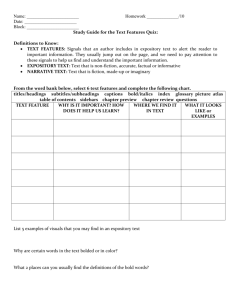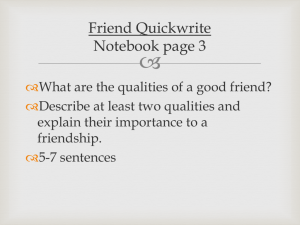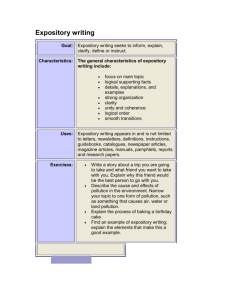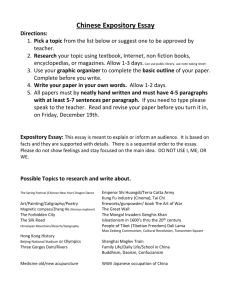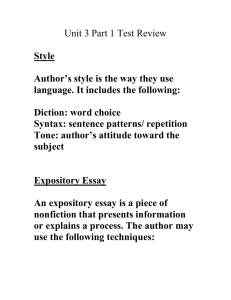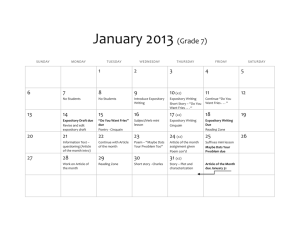Reading Lesson Plans January 25-29, 2016
advertisement
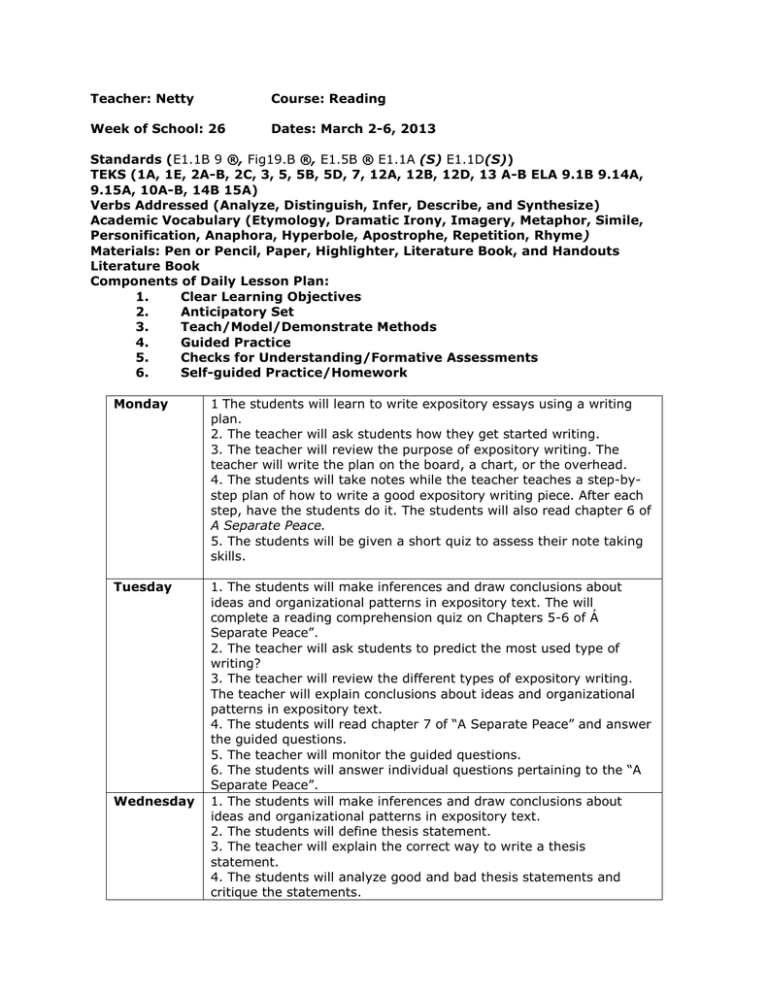
Teacher: Netty Course: Reading Week of School: 26 Dates: March 2-6, 2013 Standards (E1.1B 9 ®, Fig19.B ®, E1.5B ® E1.1A (S) E1.1D(S)) TEKS (1A, 1E, 2A-B, 2C, 3, 5, 5B, 5D, 7, 12A, 12B, 12D, 13 A-B ELA 9.1B 9.14A, 9.15A, 10A-B, 14B 15A) Verbs Addressed (Analyze, Distinguish, Infer, Describe, and Synthesize) Academic Vocabulary (Etymology, Dramatic Irony, Imagery, Metaphor, Simile, Personification, Anaphora, Hyperbole, Apostrophe, Repetition, Rhyme) Materials: Pen or Pencil, Paper, Highlighter, Literature Book, and Handouts Literature Book Components of Daily Lesson Plan: 1. Clear Learning Objectives 2. Anticipatory Set 3. Teach/Model/Demonstrate Methods 4. Guided Practice 5. Checks for Understanding/Formative Assessments 6. Self-guided Practice/Homework Monday 1 The students will learn to write expository essays using a writing plan. 2. The teacher will ask students how they get started writing. 3. The teacher will review the purpose of expository writing. The teacher will write the plan on the board, a chart, or the overhead. 4. The students will take notes while the teacher teaches a step-bystep plan of how to write a good expository writing piece. After each step, have the students do it. The students will also read chapter 6 of A Separate Peace. 5. The students will be given a short quiz to assess their note taking skills. Tuesday 1. The students will make inferences and draw conclusions about ideas and organizational patterns in expository text. The will complete a reading comprehension quiz on Chapters 5-6 of Á Separate Peace”. 2. The teacher will ask students to predict the most used type of writing? 3. The teacher will review the different types of expository writing. The teacher will explain conclusions about ideas and organizational patterns in expository text. 4. The students will read chapter 7 of “A Separate Peace” and answer the guided questions. 5. The teacher will monitor the guided questions. 6. The students will answer individual questions pertaining to the “A Separate Peace”. 1. The students will make inferences and draw conclusions about ideas and organizational patterns in expository text. 2. The students will define thesis statement. 3. The teacher will explain the correct way to write a thesis statement. 4. The students will analyze good and bad thesis statements and critique the statements. Wednesday 5. The teacher will stop and ask questions to make sure the students comprehend the lesson. 6. The students will rewrite the thesis statement. The students will read chapter 8 of “A Separate Peace”. Thursday Friday Essay Topic Write an responding to A Separate Peace Essay: Does competition bring out the best or the worst in people? 1. The students will make inferences and draw conclusions about ideas and organizational patterns in expository text. 2. The students will answer the following question: What have you learned about expository writing. 3. The teacher will go over the writing plan. 4. The students will respond to the following prompt: Think of an insect you dislike and explain why. Make sure to give good reasons and examples to support your choice.) The students will write the insect and provide reasons why and details. The students must provide an example. 5. The teacher will evaluate the students practice essays. 6. The students will revise their essay. 1. The students will participate in a timed writing. 2. The students will write the strategies they use for a timed writing. 3. The teacher will read the prompt and explain the timed writing guidelines. 4. The students will participate in a timed writing. 5. The student’s essays will be graded according to the STAAR RUBRIC.
